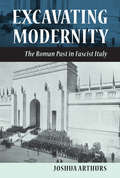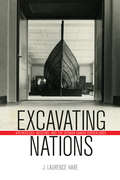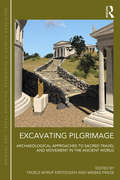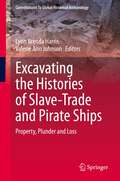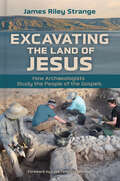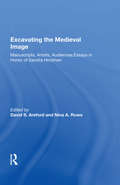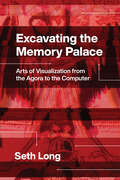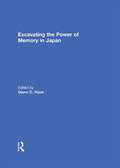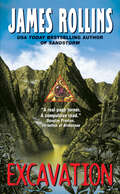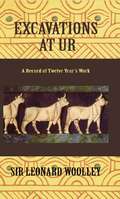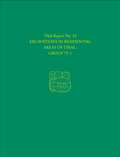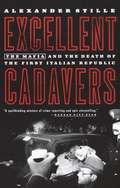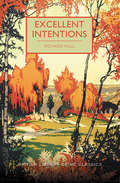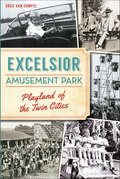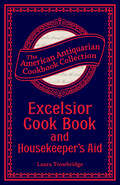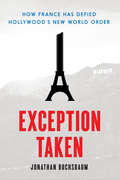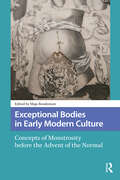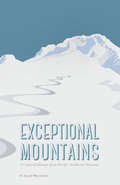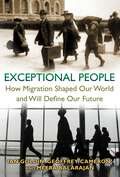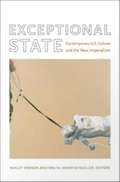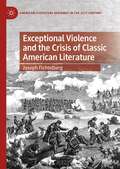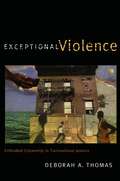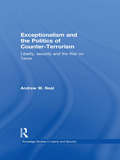- Table View
- List View
Excavating Modernity: The Roman Past in Fascist Italy
by Joshua ArthursThe cultural and material legacies of the Roman Republic and Empire in evidence throughout Rome have made it the "Eternal City." Too often, however, this patrimony has caused Rome to be seen as static and antique, insulated from the transformations of the modern world. In Excavating Modernity, Joshua Arthurs dramatically revises this perception, arguing that as both place and idea, Rome was strongly shaped by a radical vision of modernity imposed by Mussolini's regime between the two world wars.Italian Fascism's appropriation of the Roman past-the idea of Rome, or romanità- encapsulated the Fascist virtues of discipline, hierarchy, and order; the Fascist "new man" was modeled on the Roman legionary, the epitome of the virile citizen-soldier. This vision of modernity also transcended Italy's borders, with the Roman Empire providing a foundation for Fascism's own vision of Mediterranean domination and a European New Order. At the same time, romanità also served as a vocabulary of anxiety about modernity. Fears of population decline, racial degeneration and revolution were mapped onto the barbarian invasions and the fall of Rome. Offering a critical assessment of romanità and its effects, Arthurs explores the ways in which academics, officials, and ideologues approached Rome not as a site of distant glories but as a blueprint for contemporary life, a source of dynamic values to shape the present and future.
Excavating Nations
by J. Laurence HareExcavating Nations traces the history of archaeology and museums in the contested German-Danish borderlands from the emergence of antiquarianism in the early nineteenth-century to German-Danish reconciliation after the Second World War. J. Laurence Hare reveals how the border regions of Schleswig-Holstein and Sønderjylland were critical both to the emergence of professional prehistoric archaeology and to conceptions of German and Scandinavian origins.At the center of this process, Hare argues, was a cohort of amateur antiquarians and archaeologists who collaborated across the border to investigate the ancient past but were also complicit in its appropriation for nationalist ends. Excavating Nations follows the development of this cross-border network over four generations, through the unification of Germany and two world wars. Using correspondence and site reports from museum, university, and state archives across Germany and Denmark, Hare shows how these scholars negotiated their simultaneous involvement in nation-building projects and in a transnational academic community.
Excavating Pilgrimage: Archaeological Approaches to Sacred Travel and Movement in the Ancient World (Routledge Studies in Pilgrimage, Religious Travel and Tourism)
by Troels Myrup Kristensen Wiebke FrieseThis volume sheds new light on the significance and meaning of material culture for the study of pilgrimage in the ancient world, focusing in particular on Classical and Hellenistic Greece, the Roman Empire and Late Antiquity. It thus discusses how archaeological evidence can be used to advance our understanding of ancient pilgrimage and ritual experience. The volume brings together a group of scholars who explore some of the rich archaeological evidence for sacred travel and movement, such as the material footprint of different activities undertaken by pilgrims, the spatial organization of sanctuaries and the wider catchment of pilgrimage sites, as well as the relationship between architecture, art and ritual. Contributions also tackle both methodological and theoretical issues related to the study of pilgrimage, sacred travel and other types of movement to, from and within sanctuaries through case studies stretching from the first millennium BC to the early medieval period.
Excavating the Histories of Slave-Trade and Pirate Ships: Property, Plunder and Loss (Contributions To Global Historical Archaeology)
by Lynn Brenda Harris Valerie Ann JohnsonThis edited volume brings new perspectives on the topic maritime archaeology of the slave trade in the Caribbean. The book focuses on shipwrecks of the slave trade in the 18th century and suggests that there is a more complex and challenging social narrative than has previously been discussed. The authors examine biographies of ships, crew members, voyage logs, cargo inventories, trader correspondence and contextual analysis of the artifact assemblages to bring new insights into the microeconomics and maritime traditions of these floating prisons. The illustrious biography of Captain Edward Thache (aka Blackbeard) reveals past identities as a naval officer, slave trader, and pirate. Categories of artifacts in archaeological collections represent cultural connections and traditions of enslaved Africans. The volume includes several case studies that inform these narratives and examines slave ships such as la Concorde, Henrietta Marie, Whydah, La Marie Seraphique and Marquis de Bouillé. Within the larger context of slave trade during the 18th century, authors explore legal and illegal trade in the British West Indies. These studies also address the plethora of social, political, and environmental impacts on these island communities that played an integral and strategic role in slave trade economics. This volume presents up-to-date research of professional maritime historians, artifact curators, and marine archaeologists drawing upon primary source documents, artwork, and material culture. The research collaborators reconstruct the international spheres of colonial North America, Europe, Africa, and West Indies. It is an interwoven narrative, both unique and typical, to the social and economic dynamics of 18th century Atlantic World.
Excavating the Land of Jesus: How Archaeologists Study the People of the Gospels
by James Riley StrangeHow do archaeologists unearth the daily life of people from Jesus&’s time?Contrary to popular belief, archaeology of first-century Roman Galilee is not about illustrating or proving the gospels, drawing timelines, or hunting treasure. Rather, it is about understanding the lives of people, just like us, who lived in the time of Jesus. How do we conceive of Jesus and his mission as part of a larger world? How did different groups in Roman Galilee understand their identities and values? How do we interpret material culture in conjunction with textual evidence from the gospels? On a more basic level, how do we know where and how to dig?James Riley Strange teaches students how to address these problems in Excavating the Land of Jesus. Drawing on professional experience as a scientific archaeologist in Israel, Strange explains current methodology for ground surveying, excavating evidence, and interpreting data. Excavating the Land of Jesus is the ideal textbook for students seeking answers in the dirt of the Holy Land.
Excavating the Medieval Image: Manuscripts, Artists, Audiences: Essays in Honor of Sandra Hindman
by David S. ArefordMedieval images, especially manuscript illuminations, have long been treated independently of the contexts in which they were created. These beautiful miniature paintings, frequently valued as keepers of documentary evidence or as curious artistic commodities, have only recently become the focus of art historians concerned with new questions related to artistic working methods, audience and the status of the visual in the Middle Ages and the modern era. Excavating the Medieval Image argues that the illuminated image is best understood as thoroughly integrated in the material context of the manuscript - and thus, integrated in a cultural context of production and reception. Seen in this way, the illuminated manuscript becomes a kind of archaeological site, which must be carefully unearthed layer by layer. The fourteen essays gathered here are written by scholars of both medieval and Renaissance art history, and demonstrate varied methodological approaches that combine the pursuits of traditional connoisseurship and iconography with those of critical theory and historiography. In addition, the authors contribute more broadly to important interdisciplinary issues such as the study of gender, text and image, and the history of literacy and the book.
Excavating the Memory Palace: Arts of Visualization from the Agora to the Computer
by Seth LongWith the prevalence of smartphones, massive data storage, and search engines, we might think of today as the height of the information age. In reality, every era has faced its own challenges of storing, organizing, and accessing information. While they lacked digital devices, our ancestors, when faced with information overload, utilized some of the same techniques that underlie our modern interfaces: they visualized and spatialized data, tying it to the emotional and sensory spaces of memory, thereby turning their minds into a visual interface for accessing information. In Excavating the Memory Palace, Seth David Long mines the history of Europe’s arts of memory to find the origins of today’s data visualizations, unearthing how ancient constructions of cognitive pathways paved the way for modern technological interfaces. Looking to techniques like the memory palace, he finds the ways that information has been tied to sensory and visual experience, turning raw data into lucid knowledge. From the icons of smart phone screens to massive network graphs, Long shows us the ancestry of the cyberscape and unveils the history of memory as a creative act.
Excavating the Power of Memory in Japan
by Glenn D. HookExcavating the power of memory offers a succinct examination of how memory is constructed, embedded and disseminated in contemporary Japanese society. The unique range and perspective of this collection will provide an understanding not found elsewhere. It starts with a lucid introduction of how memory plays a political and wider social role in Japan. Four case studies follow. The first takes up the divergence in memory at the national and subnational levels by analysing the memory of the battle of Okinawa and US military accidents in Okinawa prefecture, illuminating how memory in the prefecture embeds Okinawans as victims of mainland Japan and of the United States. The second explores whether Japan’s membership of the International Criminal Court represents a shift in the Japanese government’s negative remembrance of the International Military Tribunal for the Far East, demonstrating how both courts are largely portrayed as being disconnected in political debates. The third offers an analysis of the surviving letters of the Kamikaze pilots in order to interrogate and compare their presumed identity in the dominant collective memory and their own self-identities. The fourth untangles how the ‘memory of winds’ in Japanese fishing communities remains an expression of social thought that presides over the ‘transmission of meaning’ about fishermen's geographical surroundings. This book was previously published as a special issue of the Japan Forum.
Excavation: A Novel
by James Rollins“A real page-turner….Rollins keeps the story in overdrive, with plenty of twists and turns before the final shocker.”—Douglas Preston, co-author of The Monster of Florence A classic adventure from James Rollins, the author of The Doomsday Key, The Last Oracle, The Judas Strain, Black Order, and other pulse-pounding, New York Times bestselling thrillers, Excavation carries readers deep into the jungles of South America, and into the terrifying heart of dark mysteries that should never be unearthed.
Excavations At Ur
by WoolleyFirst published in 2010. Routledge is an imprint of Taylor & Francis, an informa company.
Excavations in Residential Areas of Tikal--Group 7F-1: Tikal Report 22
by William A. HavilandTikal Report 22 presents the results of excavations carried out in residential group 7F-1 at Tikal in Guatemala during the 1957, 1963, and 1965 seasons. As with similar Tikal Reports (TR 19, TR 20A/20B, and TR 21), TR 22 is devoted to the presentation of detailed excavation data and analysis. In this case, the residential group presented may have been home to descendants of a ruler who died in the sixth century C.E.
Excellent Cadavers: The Mafia And The Death Of The First Italian Republic
by Alexander StilleIn 1992 Italy was convulsed by two brazen Mafia assassinations of high-ranking officials. The latest "excellent cadavers" were Giovanni Falcone and Paolo Borsellino, the Sicilian magistrates who had been the Cosa Nostra's most implacable enemies. Yet in the aftermath of the murders, hundreds of "men of honor" were arrested and the government that ad protected them for nearly half a century was at last driven from office. This is the story that Stille tells with such insight and immediacy in Excellent Cadavers. Combining a profound understanding of his doomed heroes with and unprecedented look into the Mafia's stringent codes and murderous rivalries, he gives us a book that has the power of a great work of history and the suspense of a true thriller.
Excellent Intentions (British Library Crime Classics #0)
by Richard HullWITH AN INTRODUCTION BY MARTIN EDWARDS 'From the point of view of the nation, it's a good thing that he died.' Great Barwick's least popular man is murdered on a train. Twelve jurors sit in court. Four suspects are identified - but which of them is on trial? This novel has all the makings of a classic murder mystery, but with a twist: as Attorney-General Anstruther Blayton leads the court through prosecution and defence, Inspector Fenby carries out his investigation. All this occurs while the identity of the figure in the dock is kept tantalisingly out of reach. Excellent Intentions is a classic crime novel laced with irreverent wit, first published in 1938.
Excelsior Amusement Park: Playland of the Twin Cities (Landmarks)
by Greg Van GompelMinneapolis roared into the 1920s as a major metropolis, but it lacked the kind of outdoor amusement facilities common elsewhere across the country. In 1925, Fred W. Pearce introduced the Twin Cities to his "Picnic Wonderland." Crowds eagerly poured onto the shores of Lake Minnetonka by the trolley load. Luckily, Excelsior Park survived the Great Depression and World War II on the strength of its celebrity acts. Changes in the forms of transportation, combined with innovations in the outdoor entertainment industry such as Disneyland and an aging infrastructure, eventually forced the park to close its gates.
Excelsior Cook Book and Housekeeper's Aid
by Laura TrowbridgeThere is no information available about Laura Trowbridge, but her goal in compiling Excelsior Cook Book is clear. Using her twenty-five years experience and selections from the &“best and most approved authors,&” she wished to encourage contemporary homemakers to achieve excellence in the &“skillful discharge of domestic duties.&” As cited on the title page of her encyclopedic reference, the book includes: cooking of all kinds of meats, fowl, fish; recipes for gravies, soups, sauces, bread, cakes, pastry, puddings, custards, preserves, and essences; canning fruit; methods for making butter, cheese, and soaps; antidotes for poison, cookery for the sick; a family physician&’s manual; advice on gardening, care of house plants; and many &“receipts&” for items necessary to the &“personal toilet.&” As was the custom of the day, a number of the various sections of the book are word-for-word reprints from other books and compiled by many different authors. This edition of Excelsior Cook Book by Laura Trowbridge was reproduced by permission from the volume in the collection of the American Antiquarian Society, Worcester, Massachusetts. Founded in 1812 by Isaiah Thomas, a Revolutionary War patriot and successful printer and publisher, the Society is a research library documenting the life of Americans from the colonial era through 1876. The Society collects, preserves, and makes available as complete a record as possible of the printed materials from the early American experience. The cookbook collection includes approximately 1,100 volumes.
Exception Taken: How France Has Defied Hollywood's New World Order
by Jonathan BuchsbaumIn Exception Taken, Jonathan Buchsbaum examines the movements that have emerged in opposition to the homogenizing force of Hollywood in global filmmaking. While European cinema was entering a steady decline in the 1980s, France sought to strengthen support for its film industry under the new Mitterrand government. Over the following decades, the country lobbied partners in the European Economic Community to design strategies to protect the audiovisual industries and to resist cultural free-trade pressures in international trade agreements. These struggles to preserve the autonomy of national artistic prerogatives emboldened many countries to question the benefits of accelerated globalization.Led by the energetic minister of culture Jack Lang, France initiated a series of measures to support all sectors of the film industry. Lang introduced laws mandating that state and private television invest in the film industry, effectively replacing the revenue lost from a shrinking theatrical audience for French films. With the formation of the European Union in 1992, Europe passed a new treaty (Maastricht) that extended its legal purview to culture for the first time, setting up the dramatic confrontation over the General Agreement on Trade and Tariffs (GATT) in 1993. Pushed by France, the EU fought the United States over the idea that countries should preserve their right to regulate cultural activity as they saw fit. France and Canada then initiated a campaign to protect cultural diversity within UNESCO that led to the passage of the Convention on Cultural Diversity in 2005. As France pursued these efforts to protect cultural diversity beyond its borders, it also articulated "a certain idea of cinema” that did not simply defend a narrow vision of national cinema. France promoted both commercial cinema and art cinema, disproving announcements of the death of cinema.
Exception Taken: How France Has Defied Hollywood's New World Order (Film and Culture Series)
by Jonathan BuchsbaumIn Exception Taken, Jonathan Buchsbaum examines the movements that have emerged in opposition to the homogenizing force of Hollywood in global filmmaking. While European cinema was entering a steady decline in the 1980s, France sought to strengthen support for its film industry under the new Mitterrand government. Over the following decades, the country lobbied partners in the European Economic Community to design strategies to protect the audiovisual industries and to resist cultural free-trade pressures in international trade agreements. These struggles to preserve the autonomy of national artistic prerogatives emboldened many countries to question the benefits of accelerated globalization.Led by the energetic minister of culture Jack Lang, France initiated a series of measures to support all sectors of the film industry. Lang introduced laws mandating that state and private television invest in the film industry, effectively replacing the revenue lost from a shrinking theatrical audience for French films. With the formation of the European Union in 1992, Europe passed a new treaty (Maastricht) that extended its legal purview to culture for the first time, setting up the dramatic confrontation over the General Agreement on Trade and Tariffs (GATT) in 1993. Pushed by France, the EU fought the United States over the idea that countries should preserve their right to regulate cultural activity as they saw fit. France and Canada then initiated a campaign to protect cultural diversity within UNESCO that led to the passage of the Convention on Cultural Diversity in 2005. As France pursued these efforts to protect cultural diversity beyond its borders, it also articulated "a certain idea of cinema" that did not simply defend a narrow vision of national cinema. France promoted both commercial cinema and art cinema, disproving announcements of the death of cinema.
Exceptional Bodies in Early Modern Culture: Concepts of Monstrosity Before the Advent of the Normal (Monsters and Marvels. Alterity in the Medieval and Early Modern Worlds)
by Maja BondestamDrawing on a rich array of textual and visual primary sources, including medicine, satires, play scripts, dictionaries, natural philosophy, and texts on collecting wonders, this book provides a fresh perspective on monstrosity in early modern European culture. The essays explore how exceptional bodies challenged social, religious, sexual and natural structures and hierarchies in the sixteenth, seventeenth and early eighteenth centuries and contributed to its knowledge, moral and emotional repertoire. Prodigious births, maternal imagination, hermaphrodites, collections of extraordinary things, powerful women, disabilities, controversial exercise, shapeshifting phenomena and hybrids are examined in a period before all varieties and differences became normalized to a homogenous standard. The historicizing of exceptional bodies is central in the volume since it expands our understanding of early modern culture and deepens our knowledge of its specific ways of conceptualizing singularities, rare examples, paradoxes, rules and conventions in nature and society.
Exceptional Mountains: A Cultural History of the Pacific Northwest Volcanoes
by O. Alan WeltzienOver the past 150 years, people have flocked to the Pacific Northwest in increasing numbers, in part due to the region’s beauty and one of its most exceptional features: volcanoes. This segment of the Pacific Ring of Fire has shaped not only the physical landscape of the region but also the psychological landscape, and with it the narratives we compose about ourselves. Exceptional Mountains is a cultural history of the Northwest volcanoes and the environmental impact of outdoor recreation in this region. It probes the relationship between these volcanoes and regional identity, particularly in the era of mass mountaineering and population growth in the Northwest. O. Alan Weltzien demonstrates how mountaineering is but one conspicuous example of the outdoor recreation industry’s unrestricted and problematic growth. He explores the implications of our assumptions that there are no limits to our outdoor recreation habits and that access to the highest mountains should include amenities for affluent consumers. Each chapter probes the mountain-based regional ethos and the concomitant sense of privilege and entitlement from different vantages to illuminate the consumerist mind-set as a reductive—and deeply problematic—version of experience and identity in and around some of the nation’s most striking mountains.
Exceptional People: How Migration Shaped Our World and Will Define Our Future
by Ian Goldin Geoffrey Cameron Meera BalarajanThe past, present, and future role of global migrationThroughout history, migrants have fueled the engine of human progress. Their movement has sparked innovation, spread ideas, relieved poverty, and laid the foundations for a global economy. In a world more interconnected than ever before, the number of people with the means and motivation to migrate will only increase. Exceptional People provides a long-term and global perspective on the implications and policy options for societies the world over. Challenging the received wisdom that a dramatic growth in migration is undesirable, the book proposes new approaches for governance that will embrace this international mobility.The authors explore the critical role of human migration since humans first departed Africa some fifty thousand years ago—how the circulation of ideas and technologies has benefited communities and how the movement of people across oceans and continents has fueled economies. They show that migrants in today's world connect markets, fill labor gaps, and enrich social diversity. Migration also allows individuals to escape destitution, human rights abuses, and repressive regimes. However, the authors indicate that most current migration policies are based on misconceptions and fears about migration's long-term contributions and social dynamics. Future policies, for good or ill, will dramatically determine whether societies can effectively reap migration's opportunities while managing the risks of the twenty-first century.A guide to vigorous debate and action, Exceptional People charts the past and present of international migration and makes practical recommendations that will allow everyone to benefit from its unstoppable future growth.
Exceptional State: Contemporary U.S. Culture and the New Imperialism
by Ashley Dawson Malini Johar SchuellerExceptional State analyzes the nexus of culture and contemporary manifestations of U. S. imperialism. The contributors, established and emerging cultural studies scholars, define culture broadly to include a range of media, literature, and political discourse. They do not posit September 11, 2001 as the beginning of U. S. belligerence and authoritarianism at home and abroad, but they do provide context for understanding U. S. responses to and uses of that event. Taken together, the essays stress both the continuities and discontinuities embodied in a present-day U. S. imperialism constituted through expressions of millennialism, exceptionalism, technological might, and visions of world dominance. The contributors address a range of topics, paying particular attention to the dynamics of gender and race. Their essays include a surprising reading of the ostensibly liberal movies Wag the Dog and Three Kings, an exploration of the rhetoric surrounding the plan to remake the military into a high-tech force less dependent on human bodies, a look at the significance of the popular Left Behind series of novels, and an interpretation of the Abu Ghraib prison photos. They scrutinize the national narrative created to justify the U. S. invasions of Afghanistan and Iraq, the ways that women in those countries have responded to the invasions, the contradictions underlying calls for U. S. humanitarian interventions, and the role of Africa in the U. S. imperial imagination. The volume concludes on a hopeful note, with a look at an emerging anti-imperialist public sphere. Contributors. Omar Dahbour, Ashley Dawson, Cynthia Enloe, Melani McAlister, Christian Parenti, Donald E. Pease, John Carlos Rowe, Malini Johar Schueller, Harilaos Stecopoulos
Exceptional Violence and the Crisis of Classic American Literature (American Literature Readings in the 21st Century)
by Joseph FichtelbergThis book is an interdisciplinary study of antebellum American literature and the problem of political emergency. Arguing that the United States endured sustained conflicts over the nature and operation of sovereignty in the unsettled era from the Founding to the Civil War, the book presents two forms of governance: local and regional control, and national governance. The period’s states of exception arose from these clashing imperatives, creating contests over land, finance, and, above all, slavery, that drove national politics. Extensively employing the political and cultural insights of Walter Benjamin, this book surveys antebellum American writers to understand how they situated themselves and their work in relation to these episodes, specifically focusing on the experience of violence. Exploring the work of Edgar Allan Poe, ex-slave narrators like Moses Roper and Henry Bibb, Herman Melville and Emily Dickinson, the book applies some central aspects of Walter Benjamin’s literary and cultural criticism to the deep investment in pain in antebellum politics and culture.
Exceptional Violence: Embodied Citizenship in Transnational Jamaica
by Deborah A. ThomasExceptional Violence is a sophisticated examination of postcolonial state formation in the Caribbean, considered across time and space, from the period of imperial New World expansion to the contemporary neoliberal era, and from neighborhood dynamics in Kingston to transnational socioeconomic and political fields. Deborah A. Thomas takes as her immediate focus violence in Jamaica and representations of that violence as they circulate within the country and abroad. Through an analysis encompassing Kingston communities, Jamaica's national media, works of popular culture, notions of respectability, practices of punishment and discipline during slavery, the effects of intensified migration, and Jamaica's national cultural policy, Thomas develops several arguments. Violence in Jamaica is the complicated result of a structural history of colonialism and underdevelopment, not a cultural characteristic passed from one generation to the next. Citizenship is embodied; scholars must be attentive to how race, gender, and sexuality have been made to matter over time. Suggesting that anthropologists in the United States should engage more deeply with history and political economy, Thomas mobilizes a concept of reparations as a framework for thinking, a rubric useful in its emphasis on structural and historical lineages.
Exceptionalism and Industrialisation
by Leandro Prados de la EscosuraThis 2004 book explores the question of British exceptionalism in the period from the Glorious Revolution to the Congress of Vienna. Leading historians examine why Great Britain emerged from years of sustained competition with its European rivals in a discernible position of hegemony in the domains of naval power, empire, global commerce, agricultural efficiency, industrial production, fiscal capacity and advanced technology. They deal with Britain's unique path to industrial revolution and distinguish four themes on the interactions between its emergence as a great power and as the first industrial nation. First, they highlight growth and industrial change, the interconnections between agriculture, foreign trade and industrialisation. Second, they examine technological change and, especially, Britain's unusual inventiveness. Third, they study her institutions and their role in facilitating economic growth. Fourth and finally, they explore British military and naval supremacy, showing how this was achieved and how it contributed to Britain's economic supremacy.
Exceptionalism and the Politics of Counter-Terrorism: Liberty, Security and the War on Terror (Routledge Studies in Liberty and Security)
by Andrew W. NealThis book is an analysis and critique of the concepts of ‘exception’ and ‘exceptionalism’ in the context of the politics of liberty and security in the so-called ‘War on Terror’. Since the destruction of the World Trade Centre on September 11th 2001, a notable transformation has occurred in political discourse and practice. Politicians and commentators have frequently made the argument that the rules of the game have changed, that this is a new kind of war, and that exceptional times require exceptional measures. Under this discourse of exceptionalism, an array of measures have been put into practice, such as detention without trial, ‘extraordinary rendition’, derogations from human rights law, sanction or connivance in torture, the curtailment of civil liberties, and aggressive war against international law. Situating exceptionalism within the post-9/11 controversy about the relationship between liberty and security, this book argues that the problem of exceptionalism emerges from the limits and paradoxes of liberal democracy itself. It is a commentary and critique of both contemporary practices of exceptionalism and the critical debate that has formed in response. Through a detailed assessment of the key theoretical contributions to the debate, this book develops exceptionalism as a critical tool. It also engages with the problem of exceptionalism as a discursive claim, as a strategy, as a concept, as a theoretical problem and as a practice. This is the first book to capture the importance of the exceptionalism debate in a single volume, and will be of much interest to students of critical security studies, political philosophy, IR theory and sociology.
